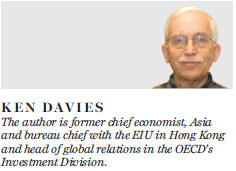President Trump and what he means for Hong Kong
Updated: 2016-11-16 09:29
By Ken Davies(HK Edition)
|
|||||||||
Will President Trump be more realistic than Republican candidate Trump? Will he be calmer, more rational, more knowledgeable? And what does this mean for the SAR?
After the biblical three score and 10 years allotted to a man, his personality is pretty well fixed. And you can't expect the sudden acquisition of wisdom and information. So Donald J. Trump will still be Donald J. Trump, a 70-year-old businessman who boasts of success despite four major bankruptcies and who promises to fix the world, or at least the United States, without any whiff of an actual policy.
But Trump is now in a different situation. He can no longer rely on his showmanship: He has to deliver. And he will have helpers.

Time after time, he promised to go after China, whom he blames for stealing the American jobs that he has vowed to bring back. Right from the start, he threatened to impose a 45-percent tariff on goods from China in an attempt to make it just as cheap to produce in the US. That would be disastrous not only for the mainland, but of course also for Hong Kong, which is still a major conduit for mainland exports and an important shareholder in China, Inc.
Don't worry. Now that he is in the White House, he will have to go through the Commerce Department, the Treasury and the economic section of the State Department. I have worked with officials in those departments (and with their opposite numbers in the Chinese government) and know they are well-informed and will not hesitate to brief Trump and his staff on the dangers of such a foolhardy policy.
Major beneficiaries of Chinese exports are giants like Walmart and Apple, who capture almost all the value from their exports from China and bring it back to the US. Their shareholders and directors will scream and shout if their trade is damaged, as will the working-class Trump voters who find they can no longer afford the Made-in-China staples on which they depend.
So what will Trump actually do?
He will use the threat of import tariffs to negotiate and renegotiate trade deals around the world. A major initial target will be NAFTA, so Mexico and the other neighbors must now watch out. Soon after that he will turn to China. Expect rambunctious exchanges of cannon fire in US-China economic diplomacy, leading sooner or later to a messy compromise that will involve promises on both sides, not punitive tariffs.
Handled well, this could actually lead to improved Sino-US economic relations. If I were in charge of the negotiations (on either side), I would advise using the impetus generated by public opinion - in China as well as in the US - to agree on measures that would open both economies more to outside investment and provide a better business climate for all enterprises, domestic and foreign. I don't think it is likely that there will be a trade war or that the two sides will retreat behind trade barriers.
But process is all. I draw attention to the probably very boisterous negotiations between the US and China rather than on the result because Hong Kong is most vulnerable to events that depress confidence. Its economy is one of the most open in the world, with total exports equivalent to 1.48 times current-price GDP; 98 percent of those exports are re-exports, mainly from the Chinese mainland (72 percent of Hong Kong's outward-processing trade is from the mainland to the rest of the world, much of it to the US). Interruptions to US-China merchandise trade would be bound to affect Hong Kong's income from this major source.
The knock-on effect of a slump in sentiment could slow growth, or even depress the SAR's four "key industries" of financial services (16.6 percent of GDP), tourism (5.1 percent), trading and logistics (23.4 percent) and professional and producer services (7.6 percent). Turbulence in US-China relations might in addition cause volatility in the property market and in capital flows to Hong Kong and to the mainland via Hong Kong.
However, once a deal is reached, there will be relative stability.
Hong Kong does have a way of responding flexibly to crises which has so far enabled it to withstand the severe external shocks that such a small and open economy is subject to. Some of the means by which it does this are open to challenge, for example the government's massive reserve fund and Hong Kong's deep foreign exchange reserves, though nobody denies that they furnish a welcome cushion against the unknown.
Trump's blustering against China and his promise to rebuild the military also suggests geopolitical uncertainty at a time when the US and China disagree fundamentally about the "nine dash line". While Trump talks of avoiding foreign military engagements, he also promises to deal with enemies by bombing the (rude word) out of them, torturing them, and killing their families. Does this mean he is a warmonger bent on conflict in the South China Sea?
At least during his "honeymoon period", Trump is unlikely to get involved in any new military activity unless the US or one of its allies is attacked. He is, after all, an ignoramus about foreign policy. I don't think his attention span is long enough for him to "read himself in"; he will rely instead on the experts he spent so much time disparaging during the election campaign. The exception is the Middle East, where he has promised to destroy ISIS shortly after the election.
So the next time you see a US carrier group, it will be as it steams into Hong Kong for the usual rest and recreation. Relax.
(HK Edition 11/16/2016 page8)